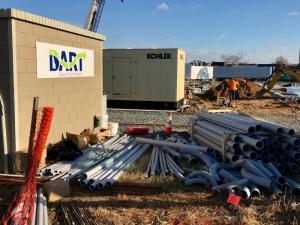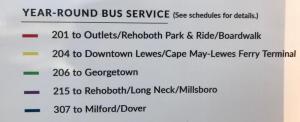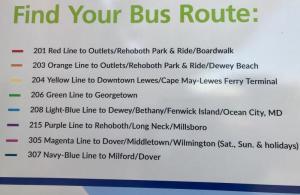DelDOT dealing with unprecedented rain, lots of projects
Not much more than a year has passed since Delaware’s Department of Transportation raised the northbound lanes of Route 1 just north of Indian River Inlet bridge by about eight inches. Chronic flooding on those oceanside lanes necessitated the work. Three or four highway closures per year were too disruptive to have done nothing.
“It wasn’t a big project and it wasn’t an expensive project,” said DelDOT Secretary Jennifer Cohan during a visit to the Cape Gazette this week. “And we know it’s only a temporary fix. But so far it has worked. We haven’t had to close that highway once since the work was completed. And this has been a record-breaking year for rainfall.”
She said this is the wettest construction season DelDOT has experienced in 125 years.
According to Accuweather statistics for its Georgetown recording station, we’ve had 51.3 inches of rainfall so far this year, as of Nov. 25. Normal for this point in the calendar year is 42.66 inches, which means we’re running 20 percent above normal. That explains why there’s still a fair number of Sussex fields with soybeans awaiting harvest.
Here’s another 20 percent figure out of her conversation with the editorial board. DelDOT buses in the resort area logged more than 247,000 passenger trips in the May through September summer season this year. That’s 20 percent more than in the same period in 2017.
C.R. McLeod, DelDOT public relations chief, joined Cohan for the visit. He said women over 65 are the majority of users of the DelDOT app where bus routes and schedules are located. “They’re the early adopters,” said Cohan.
Here are a few more nuggets of information gleaned from the secretary’s visit.
- DelDOT has contracted for 16 all-electric buses to put into service in 2019. There will be charging stations for the buses up and down the state including at the Lewes Transit Center on Route 1. “We need to do a better job of electrifying our infrastructure,” she said. “There’s a citizen demand for it.” A new $9.4 million maintenance facility at the Lewes center will service diesel and propane-fueled vehicles as well. “We’re also converting more of our paratransit buses - the smaller ones - to propane. The fuel is less expensive and it’s cleaner.” When the maintenance facility is complete, the transit center will become a terminal for commercial bus line operators like Greyhound.
- All of the design work, engineering and right-of-way acquisition are complete for the upgrade of the Harbeson intersection at Routes 9 and 5. “The only thing holding us up now,” she said “is getting utilities relocated. We don’t have any control over that and it isn’t a high priority for the utilities. Other than that, we’re ready to go.”
- Cohan said the state knows its gasoline tax revenues will decrease as more electric vehicles take to the road. “We have a pilot project in place for a mileage-based user fee, using GPS units in cars, but it’s not getting any traction in Sussex.” McLeod said there has nonetheless been a spike in gasoline purchases in Delaware: “Surrounding states have raised their gas taxes. I live in New Castle County, and up there Wawas over the state line in Pennsylvania are charging 50 cents more per gallon than the Wawas just over the state line in Delaware. No surprise. People are coming into Delaware to buy their gas.”
- Cohan and McLeod provided information about projects coming in this 2019 fiscal year and those coming over the next six years. DelDOT anticpates spending $170,331,811 in Sussex County between now and next July. Over the next six years, including FY 2019 which started on July 1, 2018, DelDOT expects to spend $1,099,842,789 in Sussex. Projects we will be seeing soonest include Route 24 widening between Love Creek and Route 1; the Draper Trail, aka Phase Two of the Lewes-to- Georgetown Trail; the Harbeson intersection; rehabilitation of the Lewes, Rehoboth Beach and Route 1 drawbridges over the Lewes-Rehoboth Canal; the park-and-ride maintenance facility; and Minos Conaway grade-separated interchange at Route 1.
“We’re tapping out on contractor capacity, and dirt and steel costs are going up - but we’re moving ahead,” said Cohan.

























































